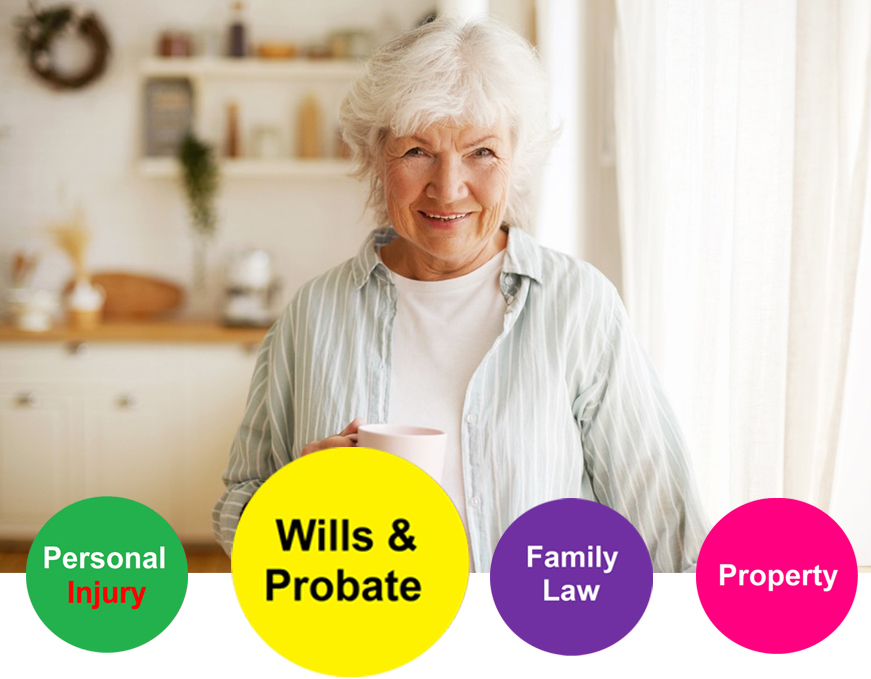Everything you need to know about dealing with a deceased person’s property:

Who is responsible for paying a mortgage after death?
If a property is gifted to a named beneficiary in a Will, it will be made subject to existing mortgages, charges and other loans, unless the Will specifically states otherwise.
However, our Probate solicitors know that if the property is subject to an existing charge, in order to retain the property, the beneficiary would need to either agree with the mortgage company to transfer the loan to their name, or redeem the loan using their own funds, if they wished to keep the property.
If the property is to be gifted to the beneficiary free of any charges, the residuary estate should be used to cover the value of the charge, before the property is assented into the name of the beneficiary, or sold and the net proceeds of sale gifted to them. This would be up to the executor of a Will to organise.
How does mortgage life insurance work?
If the deceased had a life insurance policy which was intended to cover the mortgage, known as mortgage life insurance, it may depend on who this policy pays out to as to whether it can be used to cover the mortgage or whether the beneficiary is to receive the net proceeds of the sale of the property subject to the mortgage being paid off out of these proceeds.
What happens to Joint Mortgages when one person dies?
If you are wondering 'what will happen to our mortgage after my partner dies?', 'will I have to pay the mortgage after my partner dies?', our Probate solicitors are here to help. The above all depend on the mortgage being in the deceased’s sole name. If, however, the mortgage was held jointly with another person, the survivor would need to apply to remove the deceased’s name from the jointly held mortgage, unless there is life insurance or enough funds in the residuary estate to pay this off.
If there are no funds available from the Estate to pay this, and the mortgage company will not agree to the transfer, the property would likely need to be sold to cover the funds owing to the mortgage company. For more information on what to do in this situation, do not hesitate to contact our specialist Wills and Probate solicitors today.
Do I need to wait for Probate before putting the property on the market?
A question that our Wills and Probate solicitors are often asked is whether the Executors or Administrators of the deceased’s Estate need to wait until a Grant of Probate before placing the deceased’s property on the market for sale. Our Probate Solicitors would explain that, in some cases, it may be that you can market the property, as the Executor or Administrator, before Probate has been obtained through a Grant of Probate.
To find out 'Can I put a property on the market before Probate?', contact our expert Probate Solicitors, here, for a call back within one working hour. To learn more about probate and how it works, see our probate FAQs here.
Do I need to insure the deceased’s property?
Our Wills and Probate Solicitors often get asked this question and the answer is a simple one: yes, you need to make sure that the deceased’s property is insured. You might be wondering, 'How do you insure a deceased person's home?', 'Can an executor insure a house?', or more about insuring an empty house after death. To answer these questions, and learn more about unoccupied property insurance, contact our Probate Solicitors online today, here.
If the deceased already had home insurance, many would assume that this policy can just be left in place until the house is sold. However, with some home insurance policies, the cover would automatically end if the owner or occupier is no longer alive. Therefore, it’s important to contact the insurance provider to check whether the policy is sufficient to cover the house until it is sold.
Alternatively, you can cancel the home insurance policy and take out an unoccupied property insurance policy. If you are wondering about insuring an empty house after death, our Probate Solicitors have details of a policy provider that they have previously used, which they can set up for you when you instruct them in relation to dealing with your loved one’s Estate. Alternatively, you can find your own insurer online.
The next question we are often asked is whether it matters if the policy covers the contents of the property. If the property has been emptied and all that remains is the main structure, such as the walls, kitchen units and bathroom, you may wish to highlight this to the insurance provider; they may then suggest a building cover only policy.
If, as the Executor, you do not insure the property and something were to happen to it, you may be liable to the Estate for the damage caused.
Is Probate required for foreign assets and properties?
When a person dies leaving property abroad, you should seek legal advice from a Probate Solicitor, as what will happen to it may depend on where the person lived prior to their death, and how the property is owned (i.e. with another person or in the deceased’s sole name). Quite often, the laws of the country where the property was owned will dictate what will happen to it.
You may find that it will pass to the deceased’s family, such as a spouse or children, or it may pass under their Will in that country (if they made one).
You may wish to consult a solicitor (or equivalent) in the country where the property is owned to find out what you need to do if your loved one has died. Alternatively, if you have just purchased or you are looking at purchasing property in a foreign country, you should speak to a lawyer in that country to discuss making a Will.
Remember, it is always a good idea to write a Will in England and Wales, too, if you still have ties to this country (even if it is so much as shares invested, a bank account, a car, or any personal possessions) to help make life as easy as possible for your loved one’s after your death. You can contact our expert Will drafting solicitors online, here, or via email to wills@mglegal.co.uk to enquire about making a Will.
Can I be forced to sell inherited property?
If you have inherited property under a person’s Will or the Rules of Intestacy, you may not want to sell it to pay the inheritance tax; instead, you may be hoping to move into the property.
If this is the case, you have a few options of how to keep an inherited property:
You can make payment of the inheritance tax from your own funds. You would not be entitled to claim this payment back from the estate if you intend to keep the property instead.
Another option offered by HM Revenue and Customs is paying 10% of the Inheritance Tax due, as well as any interest payable, every year, until the full balance is paid.
If you are unable to pay using either of these options, you may wish to contact our team of Wills and Probate Solicitors to discuss other options available to you.
What happens to jointly owned property after death?
If you are a beneficial joint tenant of any property, your interest passes automatically to the surviving joint tenant on your death.
In most cases this is likely to relate to your home and to any joint bank accounts or other investments you hold jointly with another person. See more on Joint Tenancy here.
What happens when a tenant in common dies?
In Tenants in Common, each owner has their own shares in the property which they own individually. For a full overview of Tenants in Common, see this here.
In these joint ownership situations, each owner should state in their will what they wish to be done with their shares in the property. If this is not the case, and the deceased does not have a will, then their shares in the property will form part of their estate and be dealt with under the Rules of Intestacy. See more on this here.
If you are seeking legal advice or assistance in the distribution of a loved one’s Estate, or the Granting of Probate, or making a claim against an Estate, then get in touch with our specialist Wills and Probate solicitors today.
Our team will assist in the distribution of the estate, and make sure your loved one’s wishes are carried out, exactly as they wanted.
Get in touch and talk to a Wills and Trusts expert today.
MG Legal's expert solicitors are experienced in dealing with all aspects of Wills, Trusts, Lasting Powers of Attorney (LPAs), and all matters relating to Probate and Estate Administration.




